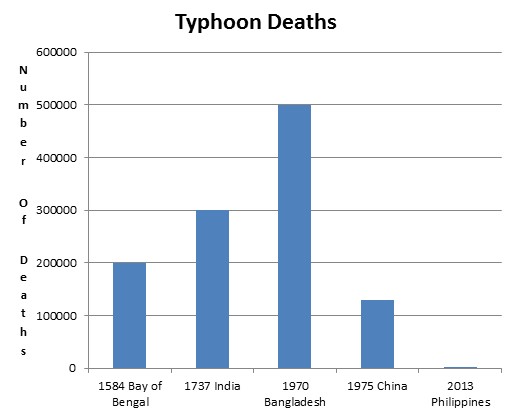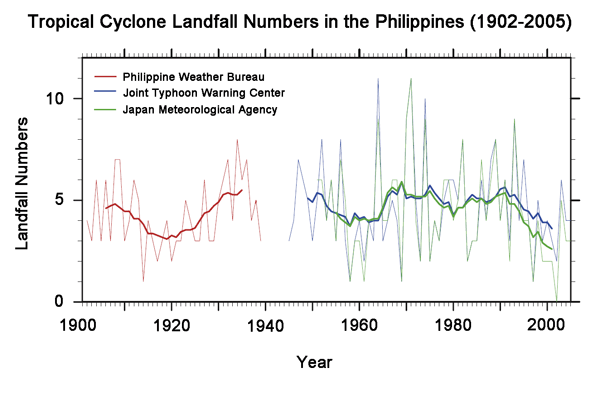
Greens co-leader Russel Norman has made headlines for taking the opportunity for NZ parliamentarians to express sympathy with the 2,000 victims of the Philippines typhoon, and using it instead to tell the House it is another warning for the planet.
The typhoon, the strongest since 2006, was the result of climate change, he said, an urgent message to humankind that Mother Nature won’t continue tolerate our wicked carbon-fuelled behaviour.
Norman quoted an understandably emotional Filipino “climate negotiator” who had said "What my country is going through as a result of this extreme climate event is madness, the climate crisis is madness.”
We can understand the emotion. But the science simply does not support what they’re saying—nor their rush to blame.
There are two striking things about this nauseously speedy rush to blame every natural disaster on man’s thoughtlessness or wickedness.
The first is how unscientific it is. As some scientists have pointed out, there is no “absolute certainty” that climate change causes things like Haiyan. Indeed, the latest IPCC report says: “Current datasets indicate no significant observed trends in global tropical cyclone frequency over the past century.” The ugly urge to say “that storm was caused by climate change”, even before serious studies have been carried out, even before the bodies have been counted, is fuelled by the weirdly self-flagellating moralism of the Green movement, by Greens’ never-flailing instinct to “prove” that modern life kills, rather than by any cool-headed assessment of the facts.
And the second striking thing about the idea that these storms are speaking to us, that Mother Nature is sending an “urgent message to humankind” through all this wind and destruction, is how backward, unenlightened and pre-modern it is. It echoes ancient notions that natural phenomena were fundamentally punishments of mankind by gods annoyed by our behaviour. It is also reminiscent of the witch-hunting hysteria of Middle Ages Europe, where, likewise, human beings – in that case, “witches” – were held responsible for weird climatic events. Witches were burned on the basis that they caused long winters, weirdly hot summers, crop failures, and, in the very cold 1628, a “year without a summer”. As German historian Wolfgang Behringer points out in his book Witches and Witch-Hunts, in that bleak era, "large-scale persecutions [of witches] were clearly linked to years of extreme hardship and in particular the type of misery related to extreme climatic events". And so it is today. That old, dark idea about man being responsible for natural phenomena, either by stirring up Mother Nature’s wrath or through some other wicked behaviour on his part, is being rehabilitated in the pseudoscientific language of climate change.
Sure, the UN Climate chief himself along with the head of the U.N. Framework Convention on Climate Change blame the Philippines devastation on climate change, arguing that tropical cyclones have increased in intensity and disasters like Haiyan are becoming more common—ignoring their own papers saying the opposite, and a historical record demonstrating that 33 of the 35 most devastating storms occurred with CO2 below current levels.


Indeed, and despite Russel Norman’s claims,
during the 20th century the number of tropical cyclones annually making landfall in the Philippines did not experience any net change. All variability was merely oscillatory activity around a mean trend of zero slope.'
Ironically, history’s two worst typhoons were both in the 1970s, when scientists feared global cooling.

Writing in the Telegraph, Brendan O’Neill argues that if there is any real lesson emanating from the typhoon’s destruction, it is that humankind in general needs more industry, not less.
Perhaps the most galling thing about the idea that the best way to deal with natural disasters like Typhoon Haiyan is to become more environmentalist, to get more serious about solving climate change, is that in fact what we need is the precise opposite of environmentalism – more industry, more economic growth, more development and more urbanisation in those parts of the world currently exposed to nature’s whims.
The pieties of environmentalism, which emphasise the importance of “appropriate” or “slow” economic growth and living in harmony with nature, would leave the less well-off at the mercy of natural forces; it is only meaningful industrialisation, of the kind that we in Britain and other Western countries have benefited from, which can erect a barrier between nature and mankind. That is why storms, earthquakes and tusnamis always have a smaller impact on developed nations than they do on under-developed nations – because big, unapologetic, manmade progress helps to keep us safe from unpredictable nature. It’s not medieval Green moralism that the Third World poor need, but rather anti-Green daring and some serious investment in modernity.
[Hat tips and pics from Climate Depot, The Hockey Schtick, Real Science]

4 comments:
Great stuff - very good post!
Oh how ironic it is for the Greens - the oh-so-in-harmony-with-nature Greens - to have got things completely and utterly WRONG with this.
Wouldn't you think that the "party of nature" would KNOW what was really going on with nature? Not so, it seems.
The "Cyclones with 10000+ fatalities" graph doesn't mean that the cyclones are getting smaller any more than a dropping road toll can be attributed to more vigorous policing of speed limits rather than safer cars and roads.
The drop in fatalities can probably be attributed more to the improvement in living conditions than anything else, so probably shouldn't be used in support of your (valid) point, as it make it too easy for detractors to pick it all apart. The fact that the biggest death toll was Bangladesh in 1970 would support this.
@TWR: Oh, indeed. Tragic as it was and still is, records show this typhoon was worse measured neither in intensity or fatalities. That was the point of including graphs showing both metrics.
So you don't believe in climate change. Big deal.
Post a Comment